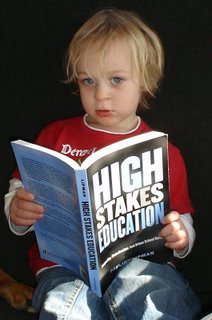High Stakes Budget Cuts in CPS
 Charlie just went down for his nap and I just read an article that will make CPS teachers freak out. According to the article in Crain's Chicago Business, CPS can't remotely balance the budget and will have to cut about 1,000 jobs along with pension woes for teachers. Last year over 1,000 teachers were let go because of budgetary constraints, so what is new? The pension and increased class size, that’s what and the union is irate. All of this makes for an interesting fight in the media, but as a friend of mine points out, taxes in Chicago have increased, property values have increased, development is up and enrollment is down, so where is the new revenue going? Good question, but there is a deeper question, who wins when education, globalization and neoliberalism come together? Better yet, how does this effect teachers and students? CPS teachers should turn to Pauline Lipman’s book, High Stakes Education for a unique, informed perspective on their schools. Lipman, a professor at DePaul University, validates even most paranoid teacher’s fears. She details the efforts of the Chicago Commercial Club, the Mayor’s office, and CPS Officials to gentrify the city and attract corporate finance at the expense of the poor. The heavy hands of globalization, neoliberalism, and simple framing are all here. I was transfixed. Is it all so bizarre though? Not too long ago the CPS website contained the phrase “people of means will choose our schools”. If that is not in your face neoliberalism, what is? I had a professor who when asked about NCLB would reply, “the con is on.” Well, CPS reform efforts were praised by Clinton and used by Bush to inform his NCLB agenda. Reading Lipman it is clear that the con rolls on. Of course kids and teachers suffer because the focus is test scores and not education. Anxiety fuels fear and fear fuels the appropriation of discretionary funds to test prep programs that are all hat and no cattle. The underlying belief is that the public and policy makers do not trust teachers to do the right thing in the classroom. From this viewpoint teachers, particularly those at “less academically rigorous” schools too often pad their lessons with fluff activities when given autonomy. The blame here is off. It needs to fall on the heads of the administrators of those buildings who do not create academically rich cultures and supervise those environments. This book provides a critical lens for understanding what is happening to teachers, administrators, and children in Chicago. Although written for academics, this book is prime reading material for a broader audience. Like all critiques, I’m left with wondering what the alternative to the status quo is. Once, in graduate school I suggested the Vishnu policy of education—one in which the current system is torn down and a new one is built in its place. Perhaps it is time… Other books that teachers and administrators should look into reading are Foucault’s Fearless Speech, Alinsky’s Rules for Radicals, and Hernstein and Murray’s The Bell Curve. I’ll write about these books in the weeks to come. |

Comments on "High Stakes Budget Cuts in CPS"
post a comment